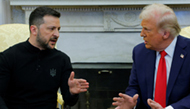▶ Calamity in Japan May Complicate Energy Aims
The disaster in Japan has altered that equation.
Energy officials in major industrial powers in the West are suddenly thinking twice about nuclear expansion. But in energy-ravenous developing countries, the unfolding crisis with Japan’s crippled nuclear reactors is unlikely to force them to rethink their energy calculus. While acknowledging the need for safety, nations like China and India say their unmet energy needs give them little choice but to continue investing in nuclear power.
“Ours is a very power-hungry country,” Srikumar Banerjee, the chairman of India’s Atomic Energy Commission, said March 13 in Mumbai. Nearly 40 percent of India’s 1.2 billion people do not have regular access to electricity, he said. “It is essential for us to have further electricity generation.”
And in China, which has the world’s most ambitious nuclear expansion plans, a vice minister of environment, Zhang Lijun, said that Japan’s difficulties would not deter his nation’s nuclear rollout.
All but paralyzed for decades after the Three Mile Island accident in 1979, the nuclear industry in the United States was poised for a comeback before the accident in Japan.
Mr. Obama and many leaders in the United States Congress agreed that nuclear power offered a steady energy source that would mitigate climate change, even as they disagreed on virtually every otheraspect of energy policy. Mr. Obama is seeking tens of billions of dollars in government insurance for new nuclear construction .
Now, that is in question.
With China and India driving the expansion - and countries from elsewhere in Asia, Eastern Europe and the Middle East also embracing nuclear power in response to high fossil fuel prices and concerns about global warming - the world’s stock of 443 nuclear reactors could more than double in the next 15 years, according to the World Nuclear Association, an industry trade group.
Not that Indian and Chinese officials are heedless of the risks of nuclear energy. India’s prime minister, Manmohan Singh, said on March 14 that his country’s Department of Atomic Energy would review all safety systems at India’s nuclear plants, “particularly with a view to ensuring that they would be able to withstand large natural disasters such as tsunamis and earthquakes.”
China’s nuclear power industry has 11 reactors operating, but on March 17, the government announced that it was suspending new plant approvals until it could strengthen safety standards. It also announced stepped-up inspections at its existing plants.
China plans to add more than 25 reactors, but most are already under construction, and it was unclear how many would be affected by the new order. China’s electricity consumption continues to climb 12 percent a year.
India, with 20 nuclear reactors already in operation, plans to spend an estimated $150 billion adding dozens of new ones around the country. Its forecast calls for nuclear power to supply about a quarter of the country’s electricity needs by 2050, a tenfold increase from now.
Three of the world’s chief sources of large-scale energy production - coal, oil and nuclear power - have all experienced eye-popping accidents in just the past year. The Upper Big Branch coal mine explosion in West Virginia, the Deepwater Horizon blowout and oil spill in the Gulf of Mexico and the nuclear crisis in Japan have dramatized the dangers of conventional power generation .
“It’s not possible to achieve a climate solution based on existing technology without a significant reliance on nuclear power,” said Jason Grumet, president of the Bipartisan Policy Center in Washington and an energy and climate change adviser to the 2008 Obama campaign. “It’s early to reach many conclusions about what happened in Japan and the relevance of what happened to the United States. But the safety of nuclear power will certainly be high on the list of questions for the next several months.”
“The world is fundamentally a set of relative risks,” Mr. Grumet added, noting the confluence of disasters in coal mining, oil drilling and nuclear plant operations. “The accident certainly has diminished what had been a growing impetus in the environmental community to support nuclear power as part of a broad bargain on energy and climate policy.”
Concerns about earthquakes and nuclear power have been around for a long time; new questions might also be raised now about tsunamis and coastal reactors.
Walt Patterson, an associate fellow at Chatham House in London, predicted that the problems at Japan’s nuclear plants would refocus attention on safety and away from the economic viability of atomic energy.
“The question mark about safety was really way down the agenda,” Mr. Patterson said. “This will bring it right back to the top of the agenda.”
On March 15, Chancellor Angela Merkel of Germany temporarily shut down all seven of the nation’s nuclear plant that were built before 1980 while their safety is reviewed.
Switzerland on March 14 suspended plans to build new plants and replace existing ones. The Swiss energy minister, Doris Leuthard, said the “safety and well-being of the population have the highest priority.”
But Italy, Russia and the Czech Republic all said they would stick to their energy policies.
Across the Middle East, countries have been racing to build up nuclear power, as a growth and population boom has created unprecedented demand for energy, and as Iran forges ahead with the Bushehr nuclear facility.
The United Arab Emirates has taken the lead with a plan to build four plants in the city of Braka, on the Persian Gulf, by 2017 to generate about a quarter of the country’s power by 2020.
The Emirates Nuclear Energy Corporation, the project’s developer, is “closely monitoring the situation in Japan,” a spokesman said on March 14 .
One of the emirates, Abu Dhabi, chose Braka because it is near the water and an existing power grid, far from populated areas, and lies on a seismically stable landmass. Because the Persian Gulf is an enclosed sea, planners say there is little threat of a tsunami in the event of an earthquake.
By contrast, Iran’s Bushehr nuclear plant, also on the Persian Gulf, is much less seismically stable, which worries environmentalists.
Any nuclear leak there would quickly reach the wealthy emirates of Dubai, Abu Dhabi and others because of the gulf’s currents .
The Iranian plant unloaded nuclear fuel in February after a computer worm infected the reactor.
Jordan, Kuwait, Qatar, Bahrain and Egypt are all also studying nuclear energy, and even oil-rich Saudi Arabia is considering a nuclear-powered city.
Most plants would be placed in seismically stable areas, although one planned by Jordan at the Red Sea port of Aqaba is on a major faultline.
Turkey on March 14 said it would move ahead with plans for two nuclear plants, including one that may use Japanese nuclear technology from the Tokyo Electric Power Company and Toshiba. Numerous geological faultlines cross the country.
In India, controversy surrounds a nuclear project on the western coast of the country, north of Goa, a tourist destination. As envisioned, it would be the world’s largest nuclear energy complex.
But analysts in India said the Japan crisis was unlikely to stir up significantly more public protest against nuclear plants here, given the pressing demand for more electricity.
“If 1 percent of the population was against nuclear power, you might now get 2 percent,” said G. Balachandran, a consulting fellow at the Institute for Defense Studies and Analysis, a policy research organization in New Delhi. “I am really not concerned about the opposition that may develop around this.”
By HEATHER TIMMONS and VIKAS BAJAJ
Accidents like the one at Three Mile Island, above, and in Japan raise doubts about nuclear power.
BILL BOWDEN/YORK DAILY RECORD, VIA ASSOCIATED PRESS
The Three Mile Island accident brought nuclear energy development in the United States nearly to a standstill.
MARTHA COOPER/HARRISBURG PATRIOT-NEWS, VIA ASSOCIATED PRESS
스마터리빙
more [ 건강]
[ 건강]이제 혈관 건강도 챙기자!
[현대해운]우리 눈에 보이지 않기 때문에 혈관 건강을 챙기는 것은 결코 쉽지 않은데요. 여러분은 혈관 건강을 유지하기 위해 어떤 노력을 하시나요?
 [ 건강]
[ 건강]내 몸이 건강해지는 과일궁합
 [ 라이프]
[ 라이프]벌레야 물럿거라! 천연 해충제 만들기
 [ 건강]
[ 건강]혈압 낮추는데 좋은 식품
[현대해운]혈관 건강은 주로 노화가 진행되면서 지켜야 할 문제라고 인식되어 왔습니다. 최근 생활 패턴과 식생활의 변화로 혈관의 노화 진행이 빨라지고
사람·사람들
more많이 본 기사
- 쿠팡 김범석, 30~31일(한국시간) 연석청문회 또 불출석 의사… “일정 있어”
- 캐나다, 우크라에 18억달러대 추가 재정 지원키로
- ‘통일교 자금관리’ 한학자 前비서실장 재소환…피의자 전환
- ‘6·3 大戰’ 앞둔 대통령실 참모들 시선집중…10여명 출마 거론
- 여야, ‘통일교·종합 특검’ 정면충돌 예고…연말연시 대치정국
- 이이경·조세호 다 떠나고..유재석 곁엔 결국 ‘무도’ 인연이었다
- 뉴욕에 3년만에 최대 폭설…항공기 수천편 결항·지연
- ‘파친코’ 이민진 작가 “맘다니 뉴욕시장, 긍정적 변화 기대”
- 태국-캄보디아, ‘101명 사망’ 교전 20일만에 휴전
- [이지 사이언스] “온난화 막으려면 세계인구 44% 식단 바꿔야…문제는 소고기”
- 황하나, 남편 사망→캄보디아서 남친과 출산..귀국 후 구속 ‘파란만장’
- 180일간 김건희만 판 특검 오늘 수사 종료…’V0’ 단죄 성과
- NASA 신임 국장 “美, 트럼프 임기내 달에 다시 갈것”
- “아동 수출국 오명 벗는다” 70년 만에 해외입양 중단
- 韓정부, 노란봉투법 해석 지침 공개… 하청 임금·근로조건 좌우하면 ‘진짜 사장’
- 특검, 김건희 ‘금품 수수’ 무더기 기소… 뇌물 여부는 경찰 몫으로
- ‘서해 공무원 피격 은폐’ 혐의 서훈… 2
- 쏟아지는 갑질·특혜 의혹… 버티는 김병기, 속 끓는 정청래
- 與 ‘통일교·신천지 특검법’ 발의… 野 “뜬금없다”
- “트럼프, 29일 네타냐후 회담서 가자휴전 이행문제 제기키로”
- 오윤아 “子, 학교 떨어져 잘못 키웠나..방치 했나 싶어 눈물”
- 한파에 고드름이 주렁주렁… 서울 이번 겨울 첫 한파주의보
- “새해 1호 법안은 2차특검” 정청래, 강경 기조 그대로
- ‘정보 유출자 셀프 조사’ 경찰에 늦게 알린 쿠팡… 증거인멸 의혹
- 김정은, 핵잠 이어 미사일 공장도 시… 2
- 젤렌스키 미국행… “레드라인 있지만 타협점 찾을 수 있어”
- ‘NCT 탈퇴’ 태일, 성폭행 혐의로 결국 감옥行..징역 3년 6개월 확정
- ‘이강달’ 강태오, 로코 달인은 다르다.. “김세정도 눈빛 좋다고”
- ‘AI 조작 번복’ 폭로자 vs ‘유재석 패싱’ 이이경..하차 잔혹사로 번진 사생활 논란 [2025 연말결산]
- 올해 美 기업 파산신청 증가… “관세·고물가·고금리 원인”
- IS 확실했나…트럼프 ‘성탄절 나이지리아 폭격’ 갸우뚱
- ‘김건희에 로저비비에 선물’ 김기현 부인 특검 재출석…곧 기소
- “개인 선정은 SON이 유일?” 손흥민, 축구계 8대 기적 선정이 더 대단한 이유 “퀴라소 월드컵 진출보다 멋져”
- 황하나, 마약 도피 중 캄보디아서 출… 1
- “올해 최고 주목받은 테크 거물은 머스크 아닌 래리 엘리슨”
- LA 등 서부에 사흘째 폭우…동부엔 폭설 예보
- ‘손흥민 감격의 첫 우승’ 올해 축구계 기적 톱8 선정 ‘선수로는 유일’
- VA·MD 7명 생굴 먹고 식중독…22개주 60여명 감염
- 뉴욕시 폭설에 항공기 수천편 취소·지연 사태
- 찰스 3세, 내년 방미 추진…트럼프에 英왕실 ‘매력 공세’될까
- 새해 맞아 백만 달러 상금 증정 이벤트와 다양한 설 행사 선보여
- 오바마케어 가입자수 감소
- ‘학자금 상환’ 안하면 임금압류
- 보수 야당 “의원직 사퇴하고 법심판 받아야”…김병기에 총공세
- 소싯적 ‘치기어린’ 주소 “굿바이”…지메일 주소변경기능 도입
- 8시즌 뛰고 ML 역대 17위 “오타니 GOAT 될 것”, ML 역대 50인 선정
- 국제은값 폭등에 개인투자자들 銀투자 대거 유입
- “온 세상에 희망·평화의 빛 스며들길”
- 조지아 역주행 사고, 한인남편 이어 임신 아내도 사망
- 물류거점창고에 불체자 8만명 수용 추진
1/5지식톡

-
 미 육군 사관학교 West Poin…
0
미 육군 사관학교 West Poin…
0https://youtu.be/SxD8cEhNV6Q연락처:wpkapca@gmail.comJohn Choi: 714-716-6414West Point 합격증을 받으셨나요?미 육군사관학교 West Point 학부모 모…
-
 ☝️해외에서도 가능한 한국어 선생님…
0
☝️해외에서도 가능한 한국어 선생님…
0이 영상 하나면 충분합니다!♥️상담신청문의♥️☝️ 문의 폭주로 '선착순 상담'만 진행합니다.☎️ : 02-6213-9094✨카카오톡ID : @GOODEDU77 (@골뱅이 꼭 붙여주셔야합니다…
-
 테슬라 자동차 시트커버 장착
0
테슬라 자동차 시트커버 장착
0테슬라 시트커버, 사놓고 아직 못 씌우셨죠?장착이 생각보다 쉽지 않습니다.20년 경력 전문가에게 맡기세요 — 깔끔하고 딱 맞게 장착해드립니다!장착비용:앞좌석: $40뒷좌석: $60앞·뒷좌석 …
-
 식당용 부탄가스
0
식당용 부탄가스
0식당용 부탄가스 홀세일 합니다 로스앤젤레스 다운타운 픽업 가능 안녕 하세요?강아지 & 고양이 모든 애완동물 / 반려동물 식품 & 모든 애완동물/반려동물 관련 제품들 전문적으로 홀세일/취급하는 회사 입니다 100% …
-
 ACSL 국제 컴퓨터 과학 대회, …
0
ACSL 국제 컴퓨터 과학 대회, …
0웹사이트 : www.eduspot.co.kr 카카오톡 상담하기 : https://pf.kakao.com/_BEQWxb블로그 : https://blog.naver.com/eduspotmain안녕하세요, 에듀스팟입니다…
케이타운 1번가
오피니언

새해 더 중요해지는 노동법 준수

연말연시, 안전하고 차분하게
 캐슬린 파커 워싱턴포스트 칼럼니스트
캐슬린 파커 워싱턴포스트 칼럼니스트 [캐슬린 파커 칼럼] 지미 라이의 마지막 희망
 유경재 나성북부교회 담임목사
유경재 나성북부교회 담임목사 [한국춘추] 미국의 힘
 전병두 서북미수필가협회 회원
전병두 서북미수필가협회 회원 [금요단상] 비자 발급
 박일근 / 한국일보 수석논설위원
박일근 / 한국일보 수석논설위원 [지평선] 스님의 주례사
 신상철 / 고려대 고고미술사학과 교수
신상철 / 고려대 고고미술사학과 교수 [미술 다시보기] 신의 모습을 닮고자 한 예술가
 스티브 강 전 한인민주당협회 회장
스티브 강 전 한인민주당협회 회장 [스티브 강 ‘인사이드 미국’] 2026 중간선거: 트럼프 지지율 하락이 말해주는 것
 김홍일 케이유니콘인베스트먼트 대표
김홍일 케이유니콘인베스트먼트 대표 [기고] 안정의 기준은 어떻게 제도가 되었나
1/3지사별 뉴스

물류거점창고에 불체자 8만명 수용 추진
도널드 트럼프 행정부가 이민자 구금·추방을 효율화하기 위해 전국 물류거점 창고에 8만명 규모의 수용시설 확보를 추진한다고 24일 워싱턴 포스트…
‘학자금 상환’ 안하면 임금압류

“온 세상에 희망·평화의 빛 스며들길”
가자지구와 우크라이나에서의 전쟁, 고립과 불평등으로 세상이 어지러운 가운데 워싱턴 지역 각급 한인교회와 성당들이 성탄절을 맞아 일제히 예배와 …
“연말은 스트레스·새해 결심은 없다”

“올해 최고 주목받은 테크 거물은 머스크 아닌 래리 엘리슨”
올해 미국에서 가장 주목받은 기술업계 거물은 일론 머스크 테슬라 최고경영자(CEO)가 아닌 래리 엘리슨 오라클 창업자·회장이라고 블룸버그 통신…
[새해부터 이렇게 달라진다] 최저임금 또 오르고… 유급 병가는 더 확대

오늘 하루 이 창 열지 않음 닫기 























































.png)


댓글 안에 당신의 성숙함도 담아 주세요.
'오늘의 한마디'는 기사에 대하여 자신의 생각을 말하고 남의 생각을 들으며 서로 다양한 의견을 나누는 공간입니다. 그러나 간혹 불건전한 내용을 올리시는 분들이 계셔서 건전한 인터넷문화 정착을 위해 아래와 같은 운영원칙을 적용합니다.
자체 모니터링을 통해 아래에 해당하는 내용이 포함된 댓글이 발견되면 예고없이 삭제 조치를 하겠습니다.
불건전한 댓글을 올리거나, 이름에 비속어 및 상대방의 불쾌감을 주는 단어를 사용, 유명인 또는 특정 일반인을 사칭하는 경우 이용에 대한 차단 제재를 받을 수 있습니다. 차단될 경우, 일주일간 댓글을 달수 없게 됩니다.
명예훼손, 개인정보 유출, 욕설 등 법률에 위반되는 댓글은 관계 법령에 의거 민형사상 처벌을 받을 수 있으니 이용에 주의를 부탁드립니다.
Close
x